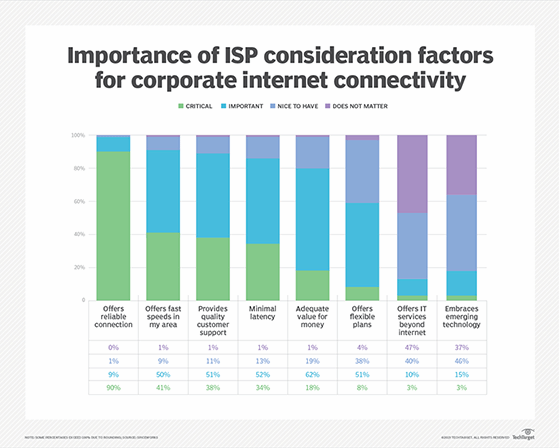
Fotolia
The 5G future will spark an evolution of telecom networks, ISPs
Telecom networks are evolving thanks to new technologies such as 5G. This evolution will affect various types of organizations, ISPs and available services.
Around 55% of IT business decision-makers anticipate adopting 5G devices within a year of availability, which means network services and internet service providers, or ISPs, will transform along with the technology, according to a recent study.
New research from Spiceworks -- a network community for IT professionals -- showed that new technologies such as 5G have sparked an evolution of telecom networks. With advances in 5G, wireless broadband, software-defined WAN (SD-WAN) and other technologies, enterprises have more options, and providers have more pressure to adapt to meet customer requirements.
Spiceworks -- based in Austin, Texas -- released the 2019 State of Corporate Connectivity study after surveying more than 700 IT business decision-makers in the U.S. and the U.K. about the evolution of telecom networks and ISPs, in particular. The study looked at current internet connectivity, various services ISPs offer and how business decision-makers feel about 5G.
Overall, the study found 82% of organizations use optical fiber at headquarters for internet connectivity, though many use multiple connectivity options. Also, enterprises are more likely to purchase additional services from ISPs than smaller organizations to more easily support their larger networks with multiple services from a single provider. The majority of organizations surveyed said they plan to quickly embrace 5G, which will spark further evolution of telecom networks, as well as ISP services.
Effect of 5G on ISPs and telecom networks
Among upcoming 5G-capable devices -- such as smartphones and tablets -- around 44% of business decision-makers said they plan to purchase 5G-capable modems once available. These modems with highly anticipated 5G features, such as increased speed and network capacity, could operate as backup internet connections for organizations.
Also, 5G-capable modems could encourage network transformations, as organizations may move from legacy connections and infrastructures to embrace new technologies, such as IoT and AI. Modems with 5G capabilities could also expand mobile workforces within organizations or allow for these workforces to emerge, according to the study.
For ISPs, it is critical to explore 5G and its capabilities now, in order to determine how to offer 5G services and support customers. The newest era in the evolution of telecom networks is in its early stages, and already a quarter of business decision-makers said they believe their ISP can provide necessary information on 5G and its potential effects. Modems and other 5G-capable devices can also help ISPs reach more potential customers and extend their services to further locations, according to Spiceworks.
Where telecom's evolution currently stands
While 82% of organizations use optical fiber for connectivity at headquarters, other new technologies, such as cable broadband and wireless broadband, replaced legacy technologies, including DSL, T1 and dial-up -- which 2% of respondents said they still use. Yet 62% of organizations said they subscribe to more than one ISP and have more than one internet connectivity option.

Enterprises listed AT&T as the most popular ISP, while SMBs preferred Comcast or Charter Spectrum, according to the study. Respondents' main requirement when choosing an ISP was reliability of services and connections, followed by faster speeds, quality customer support and low latency. Overall, respondents said they were satisfied with their current ISP.
Other important ISP requirements for organizations were download and upload speeds, as 30% of organizations have a maximum upload speed below 50 Mbps, Spiceworks said. Yet 13% of respondents said they pay for gigabit download speeds. Enterprises were more likely to invest in gigabit speeds; 32% of enterprise business decision-makers said they do, while only 7% of SMB respondents said the same.
The ISPs services beyond the internet
Beyond internet connectivity, the main services organizations said they purchased through ISPs included the following:
- VoIP
- VPNs and MPLS
- mobile data
- unified communications
- SD-WAN
- data storage
Of the organizations surveyed, enterprises were more likely to purchase additional services than SMBs, due to their larger size. But only about half of total organizations were aware of the other services available from their ISPs.
With 5G, SD-WAN and other advances on the rise, the study found now is a prime time for organizations to advance their network infrastructures -- and for ISPs to develop modernized services to benefit the shifting goals and necessities of organizations.







